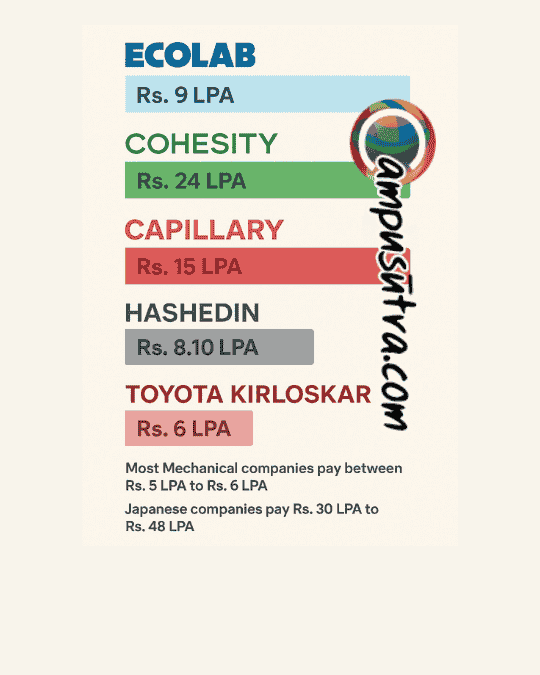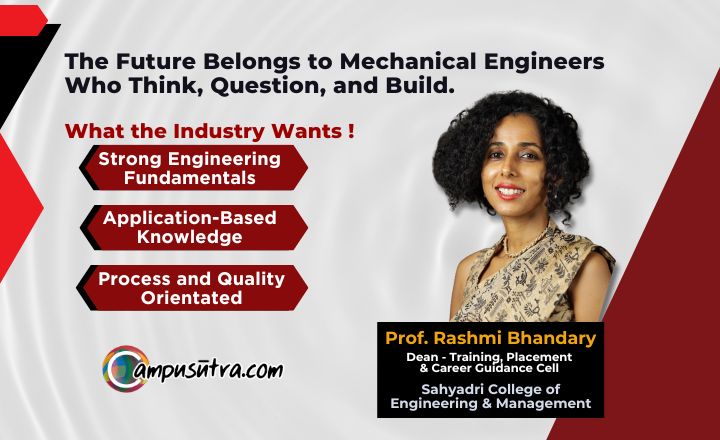As Dean of Training, Placement, and Career Guidance, I’m in constant dialogue with recruiters from core mechanical sectors—automotive, manufacturing, energy, HVAC, and design. These conversations reveal a consistent theme: beyond textbook knowledge, they seek engineers who can translate theory into practice, adapt to emerging technologies, and contribute meaningfully from day one.
Engineering Entrance Exam 2026. B Tech last date and Application Fees
These interactions go beyond placement logistics; they’re windows into the evolving DNA of industry expectations.
What I hear repeatedly is this: companies aren’t just looking for B Tech students who can solve textbook problems. They want engineers who can think in 3D, work hands-on with tools and tech, and adapt to real-world constraints with creativity and discipline. It’s a call for mechanical minds who can bridge the gap between CAD models and shop-floor realities, between thermodynamics and product innovation.
Sahyadri College of Engineering & Management (SCEM) B Tech Placements 2025
One truth emerges consistently: future engineers must be more than syllabus-smart. They must be grounded in fundamentals, fluent in application, and bold in innovation.
Bridging Fundamentals, Application, and Innovation – Not just Theoretical
1. Strong Engineering Fundamentals
Core companies emphasize a deep understanding of mechanical basics such as:
- Engineering Drawing – the universal language of design.
- Strength of Materials (SOM), Kinematics and Dynamics of Machines (KOM & DOM), and Theory of Machines – essential for designing, analyzing, and improving mechanical systems.
Industries expect graduates who can relate theory to the real world—knowing not just “what” but “why.”
2. Practical and Application-Based Knowledge
The transition from textbooks to tools is where many engineers struggle. Companies prefer candidates familiar with:
- IC Engine mechanisms, Transmissions, and Automobile Systems
- Motors, Pumps, and Electrical Components
Hands-on learning through labs, internships, and projects helps bridge this gap and makes students truly industry-ready.
3. Data, Process, and Quality Orientation
Today’s industries combine mechanical expertise with digital precision. Knowledge of process control, data science, and quality assurance (QA) using statistical tools is increasingly valuable. Engineers who can connect manual calculations with data-driven methods can improve performance and reliability.
4. Curiosity and Interdisciplinary Thinking
Companies admire engineers who think deeply and ask questions—like why a bird sitting on a wire doesn’t get an electric shock. Such curiosity reflects strong fundamentals and creative problem-solving, both vital in modern engineering.
A Thought to End With
Mechanical engineering in B Tech / M Tech has always been about building, improving, and understanding the world around us. The expectations from industry are clear, but real progress depends on how sincerely we adopt these principles in classrooms and workshops.
 We know what is needed. Our challenge, as educators and mentors, is to ensure that this bridge is not just aspirational but built, tested, and walked across before graduation.
We know what is needed. Our challenge, as educators and mentors, is to ensure that this bridge is not just aspirational but built, tested, and walked across before graduation.
Average Salary Range of some Companies who are on the look out for freshers from Mechanical and related are listed as reference :
Campusutra Editorial Comment :
Mechanical engineers are in demand in multiple industries and across verticals. Traditional B Tech mechanical engineering has evolved with time to offer an advanced ‘future ready’ study of B Tech / M Tech mechanical engineering courses and recruitments are happening at a fast pace and the trend shall continue.
Top companies hiring Mechanical Engineers across Indian Colleges as reported by us are : BHEL, NTPC, GAIL, IOCL, Escorts, Eicher, Hindustan Aeronautics Limited (HAL), JCB, NHPC, Honda, Hero Motocrop, Tata Motor, TVS, Ecolab, HashedIn Deloitte, Toyota Kirloskar and many others.







